Back To Simplicity
Why did a farm girl turned corporate America success story head back to the family farm after retirement? She found a way of life on the land she couldn’t find in the boardroom.
The first piece of advice Beverly Bowen offered was, “Keep it simple.”
She stood barefoot in her foyer while the streaming sunlight lit the amusement in her hazel eyes. She watched my crew and me studying her pristine rugs and the bottoms of our shoes. When we asked about taking them off, she responded with a casual toss of her slender hands. Not a wave. Not even a shrug. Less interest than that. More of an exhale if exhales weren’t necessary.
“Keep them on. Take them off. Do whatever you like. Keep it simple.” Then she gave a hand dismissal with more enthusiasm. “Just keep them on.”
We checked our shoes again anyway.
We’d arrived minutes earlier in a rental SUV with Florida plates that had faithfully carried us and our camera equipment from the Raleigh, North Carolina, airport to Beverly’s home in Greensboro. She lived in a neighborhood just outside an industrial park where Amazon, FedEx and Del Monte ship their wares, and where American Express has a super-secret data center that keeps tabs on America’s buying habits, like when consumers buy Del Monte products on Amazon that are shipped via FedEx.
She moved to Greensboro in 2006 during her successful 30-year corporate career. When we pulled into her driveway, Beverly was picking fresh mint from her front yard. Outside of adding zest to her tea, that mint also brings her around $2,000 annually in sales through Tall Grass Food Box, a community-supported agriculture (CSA) group focused on Black farmers.
Beverly had invited us for a farm-to-table brunch. She promised to fix spinach-bacon-prosciutto quiche, grilled pork loin, fresh melons, yogurt with berries and granola, and berry Bundt cake with fresh blackberries. When the rest of our traveling companions learned about the brunch, they jumped on the hood of our SUV rental determined to come along. We lost them along Interstate 40 somewhere in Orange County.
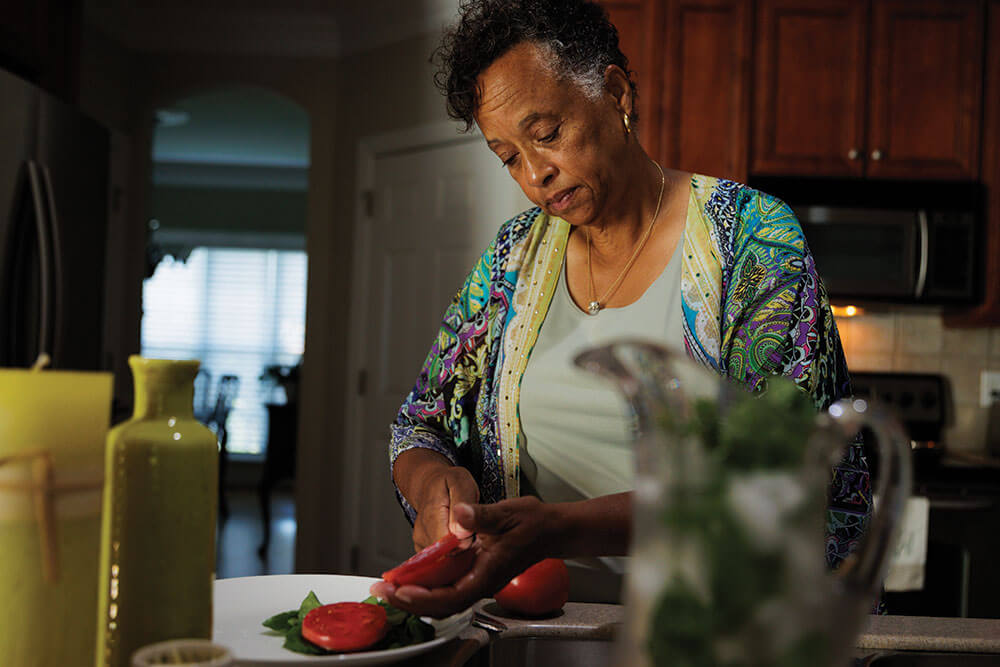

Beverly didn’t greet the three-person Noble crew (here to document her story) like strangers, even though we were. When we stepped out of our rental, she greeted us like friends stopping by for a visit, the first she’d entertained at home since COVID.
Before taking us inside, Beverly walked us along her home garden pointing out cabbage, Brussels sprouts, basil, asparagus, fingerling potatoes, rhubarb, garlic, chives and Carolina Reaper peppers, a pepper so dangerously hot I never turned my back on it in case the plant tried to make a move.
Inside, she set about preparing for brunch, and we settled in for a day of life advice, flavorful food and a story that took us from the steamy fields of North Carolina to the stuffy boardrooms of corporate America. And back again. It would be a journey into what it feels like to chase freedom. And it would leave blackberry stains on our fingers. But that’s freedom for you. Always leaving behind something sweet.
Keep it simple
At first, what seemed like Beverly’s nonstarter answer to my non-starter question in her vestibule turned out to be insight into her entire worldview. If a thing as complex as a life can have a motto, “keep it simple” might be Beverly’s. It’s how she’s moved from growing up on a family farm, to living a corporate career spanning three decades, to returning to the farm in her late 60s.
She kept it simple.
It’s how she decides what crops to plant each year, what hours to work the farm, what land management decisions to make, what activities will fill her day, what money to spend on what, what attitude to have about choices, and whether or not you can wear shoes on her rugs.
Beverly takes the complications of life and cuts out the complicating part. Returning to farming at retirement age sounds like one of those complications, but the reason was simple.
“It’s a sustainable lifestyle. It’s about being self-sufficient. I could live off the grid. I don’t care to,” she says, while slicing the rind off a pale-green melon with such poetic ease she could be strumming a harp, “but I could. It’s about survival. It’s about a healthy lifestyle. It’s about having your own food supply.”
At 67 years old, she’s lived all the extremes: from farm kid to higher education to high-stakes capitalism. In 1976, after graduating from the University of North Carolina at Greensboro with a degree in business administration, she joined McDonald’s Corp., working as a regional manager, a training development manager and as a liaison between the owner-operators and the corporation. Her career took her from one white-collar corporate environment to another, moving from McDonald’s to IBM to GCA Services Group, Inc. (now part of ABM Industries.)
It was a world away from her life on a 60-acre family farm in the Piedmont Region of North Carolina.
Raised on the farm
Beverly grew up raising tobacco, row crops, cattle, hogs and vegetables on Blackwell’s Farm, located half an hour from her current home in Greensboro and purchased by her parents in 1945. She grew up in the heat of the day, by the sweat of her brow. She grew up in the dirt and grime and toil of tending to the earth in hopes the earth would give back.

For 22 years, she lived and worked on the farm, leaving for college only to return weekends and summers to earn money for tuition and wisdom for life.
Outside of the hogs and tobacco, a topic that makes her lips compress in disgust, she’s now continuing her parents’ tradition on Blackwell’s Farm.
“That’s your least favorite crop,” I point out.
She gives that don’t-doubt-me look mothers have perfected over a millennium. “Everybody will tell you that, okay?”
Okay.
Not all farm work was as bad as growing tobacco, but it all started early. Chores on the family farm became part of life when she was “knee-high to a duck,” she says. “Whatever age it was that you were old enough to do something, you were out there doing something.”
It was a life of early to bed, early to rise, with back-breaking labor in the between hours. The most loathsome chores, she recalls, involved watering the pigs in the heat of the day. And, of course, anything to do with the tobacco. Oiling it. Tying it. Harvesting it. Every step required days of agony.
“It was a tough life,” she says, stating facts without pity. “My parents worked for what they got.”
And, yet, it also wasn’t a bad life, only a labor-intensive one.
“We were brought up by meager means, but we had everything we needed.” Now finished with the melon, she slices Cherokee Purple tomatoes like a bow working a Stradivarius. “We were not out there wondering where the next meal was going to come from. My parents were very good money managers. And, so, no, we didn’t have a bad life.”
Beverly simply wanted a different one. In college, that made her stand out among her classmates.
“I had more ethics. I had values,” Beverly says, before naming the major difference between the other students and her. “And I knew I had a mission, because,” she says with stressed conviction, “I was not going back to that farm to work.”
When she was done with college, she was done with the farm. So she thought.
The corporate “farm”
Beverly was ready to make her way in the world, like her aunt Anna Mason, who worked as a dietician for Nelson Rockefeller in New York City. She left the farm for greener pastures, all covered in concrete, and landed her first big corporate position with McDonald’s in Raleigh.
For 17 years, she worked at a different kind of farm. It had air-conditioning and padded seating, fewer hand tools and no water buckets, but the labor remained. Eventually, with twin boys at home and an ailing mother, she knew she needed a change. So, she paused her full-time corporate career for a part-time corporate career, first with IBM, then with Pricewaterhouse- Coopers & Lybrand.
In 2006, the changes fell like dominos. She left Raleigh for Greensboro, sent her boys off to college, buried her mother and finalized her divorce.
“That was a year,” I say.
She agrees, her hazel eyes losing their amusement. “That was a year.”
Now, with the meal prepped and ready, Beverly set the table with ornate china, the kind usually kept behind glass cases. For her, though, nothing collects dust. Everything has a use, like her fancy plates for a table of strangers. Give her potting soil and chicken manure and she’ll grow oregano, thyme, eggplant, cucumbers, pole beans and Egyptian fly onions on her back porch. Give her whole milk, and she’ll make butter. Give her 10 more years in the corporate world, and she’d restart the farm.
In her great upheaval year of 2006, Beverly took a full-time position as a human resources director for GCA and executed her plan. She’d need money to restore and operate the farm again. The farm girl turned corporate woman was going home.
“Corporate America doesn’t pay you to think. They pay you to do a job,” she says now, while sitting in the back seat of our rental.
Before leaving her house, she had changed from an elegant blouse to a pink button-up, from barefoot to shoes, from no hat to hat, and from no gun on hip to gun on hip. The transformation from white-collar to blue-collar was complete.
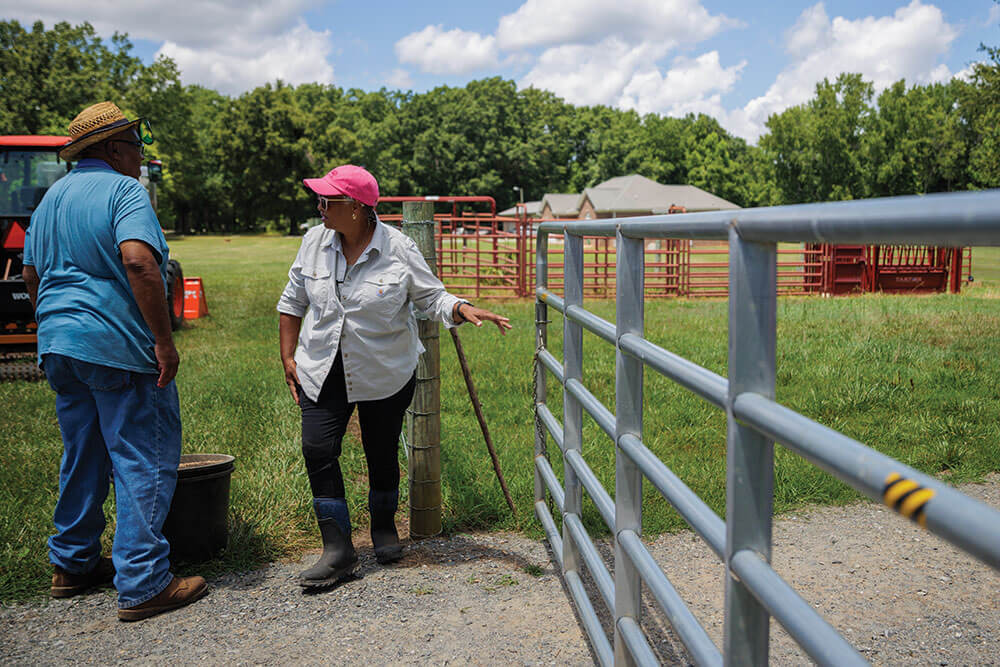
Now, in between giving directions to her farm and pointing out a stop sign everyone misses, she offers her well-earned insight into the business world.
“Corporate America teaches you obedience and loyalty. If you don’t conform, you are out the door.”
To succeed, she learned to keep her opinions unspoken, her thoughts quiet, her tongue still, and her eyes on payday. Why did her mindset about the farm change?
“Once you get beat up in corporate America a few times, it’s a reality check,” she says, while North Carolina green pastures passed by the window. “(Farming) wasn’t a bad life after all. After you’ve been run over, backed over, stood on a few times, oh, no, no, no, no, wasn’t a bad life at all. Because I can go (to the farm) and then do what I want to do.”
Four years before retirement in 2016, her plans to return finally went into action.
Home again, home again
Through the years, Blackwell’s Farm had been leased out for cattle grazing and given over to nature’s wild side. It was, as she put it, “a hot mess.”
“If my dad could have come back and seen what we had done to the farm and destroyed it, he would have murdered us all,” she says matter-of-factly.
If my dad could have come back and seen what we had done to the farm and destroyed it, he would have murdered us all.
Beverly Bowen
The farm needed an agricultural well for the cattle, perimeter fencing for the waterways, old fencing removed, overgrown trees cleared out, the pond cleaned, the dam cleaned and a new spillway built, just to get started. With four years left of her 10-year plan, she reached out to Farm Services programs to check on any available assistance.
“I knew I could not go out there and do it myself, because I needed someone as an advisor,” says Beverly, who never mentioned her age as an obstacle, because it wasn’t.
Within two years, the Farm Service Agency approved her revitalization plans and helped fund the well, the waterways and the perimeter fencing. Meanwhile, she and her brother, Seth Blackwell, the farm’s co-owner and operator after his retirement from the U.S. Department of Defense in California, worked on restoring the old feed barn, which meant the two of them cutting down and hauling poplar trees during the hottest part of 2016.
“I came out (of the woods) with 50 zillion chiggers. And poison ivy. I had everything. I took Benadryl for two weeks. It was awful. It was absolutely awful,” Beverly says, before adding in her southern accent, “And it was so funny.”
Future-forward farming
Now, the land is returning to productivity. There’s no tobacco, of course. Or pigs. No sheep or goats. There’s beef. There’s seasonal crops. And there’s an eye on the future of the soil.
“How my parents farmed, I can’t farm that way. Otherwise, these cows are not going to have anything to eat,” says Beverly, who uses regenerative practices to support her farm’s sustainability. “You’ve got to prepare for the next generation, and you’ve got to leave it better than what your parents left you.”
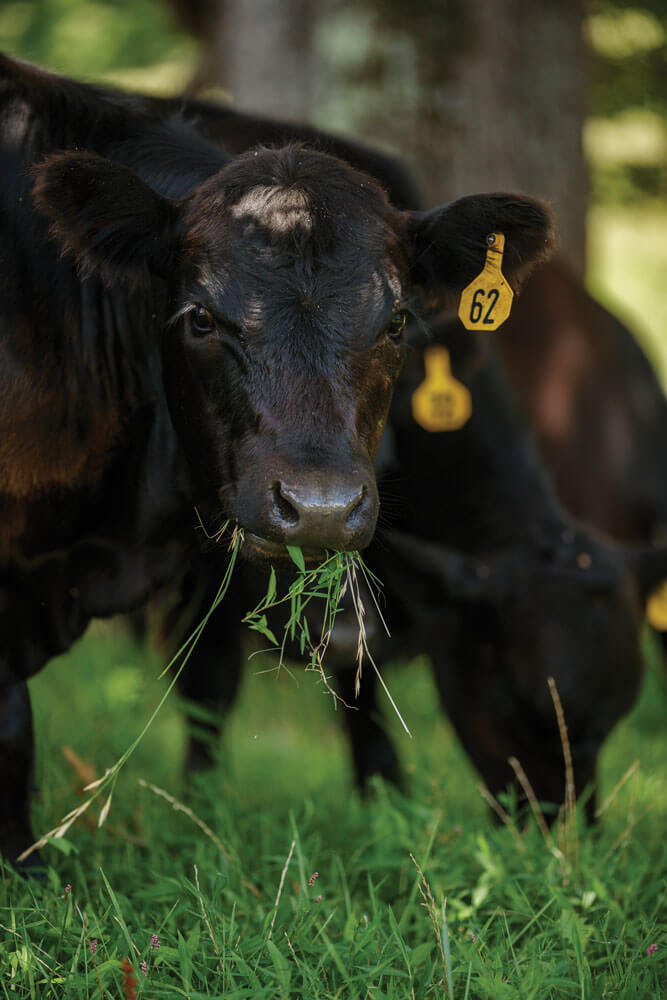
Beverly sticks with only what produces profit for her farm, a hard lesson learned from the corporate world. That means no squash or melons or zucchini for Blackwell’s Farm. She leaves that to the big boys, the commercial growers who have the manpower. She knows her land, knows her capability and knows the sweet spot for her small farm. So, she focuses on rotational grazing for her small herd of Angus cows and planting seasonal crops like mustard greens, kale, radishes and purple-top turnips.
“I’m a strictly seasonal grower, based on the water supply here. There’s too much needed in the summer. It’s cost-prohibitive,” she says. “I learned that through the school of hard knocks. I’ve determined over the six years here that what works for me is the fall crops.”
Beverly doubles her cover crops per season with cereal rye mixed with turnips or daikon radishes in the fall and a mixture of brown and pearl millet in the summer. She’s building micronutrients in the soil, while also providing a feed crop for the cattle and a cash crop for her bottom line. She’s also enrolled in the USDA Conservation Stewardship and Pastureland Conservation Reserve programs, which financially support farmers who steward their land with a focus on providing a sustainable, thriving environment for wildlife and pollinators.
Her regenerative practices are working on the farm and for the community, one of the reasons she was honored last September at Farm Aid 2022 in Raleigh. Hosted by Willie Nelson and friends, Farm Aid raises awareness and funds to support family farms.
“I did a press conference and everything. I was there with Sheryl Crow, Dave Matthews, John Mellencamp, Willie Nelson and five farmers (chosen) in the southeast,” she says. “They showed a video clip of us on the farm, brought us up to the front row and asked us questions on climate change and legacy.”
Living simply
Farming for Beverly and Seth is a family heritage, a fact she points out as Blackwell’s Farm approaches on the left.
“This is a first cousin here,” she says, pointing out the window, before turning to the other side of the road. “First cousin across there on the other side of that house.” And another one. “That’s a first cousin right there, too.”
The Piedmont Region rolls with a thick green, even after unseasonably strong windstorms that blew burly trees to their death. Modest, well-kept homes are surrounded with acres of native grasses at their feet, like children waiting for story time. Rows of soybeans, tobacco and wheat wave a welcome. Beverly may live in Greensboro, but this is still home.
“My parents always said, ‘Always have something of your own,’” she says, grateful for the freedom the farm brings and the local food source it provides to her family, neighbors and community.
Gravel crunches under the tires as we turn off the road. Blackwell’s Farm slants downward ever so slightly. The pull to move in closer, to snuggle into the shade, to lean against the barn as the cows pass by in a breeze, could just be gravity. But that’s unlikely. Meanwhile, the beguiling quiet, interrupted only by the moan of cattle, drains all the city noise from your bones.
In the shade of seven-foot-tall blackberry bushes, Seth squints into the sunlight under a broken but beloved straw hat. He holds a basket full of blackberries with the coordinating stains on his fingers, pushes up his browline glasses, and welcomes the excuse to stop and chat a spell. Before long, the blackberry stains coat my fingers, too. Seth shows me the best bunches with the sweetest flavor yet to be picked. If you eat them off the vine, you don’t need a basket.
Out here, the other small farmers may not yet fully support Beverly and Seth’s ideas for regenerative ranching principles. They do, however, always support each other. When Beverly needs seed, she can purchase it from larger farms that buy in greater bulk. When the season is plush, neighbor farmers bring by extra peaches and turnips. When elderly members of the community need additional food supplies, Beverly returns the favor.
“If you need something, I’m there to help you. It doesn’t come with a dollar amount. That’s what people used to do. That’s what farmers in the community did,” says Beverly, before offering her last piece of life advice. “You’ve never seen a Wells Fargo truck following a hearse. So, give back and be happy.”
Seems simple enough.
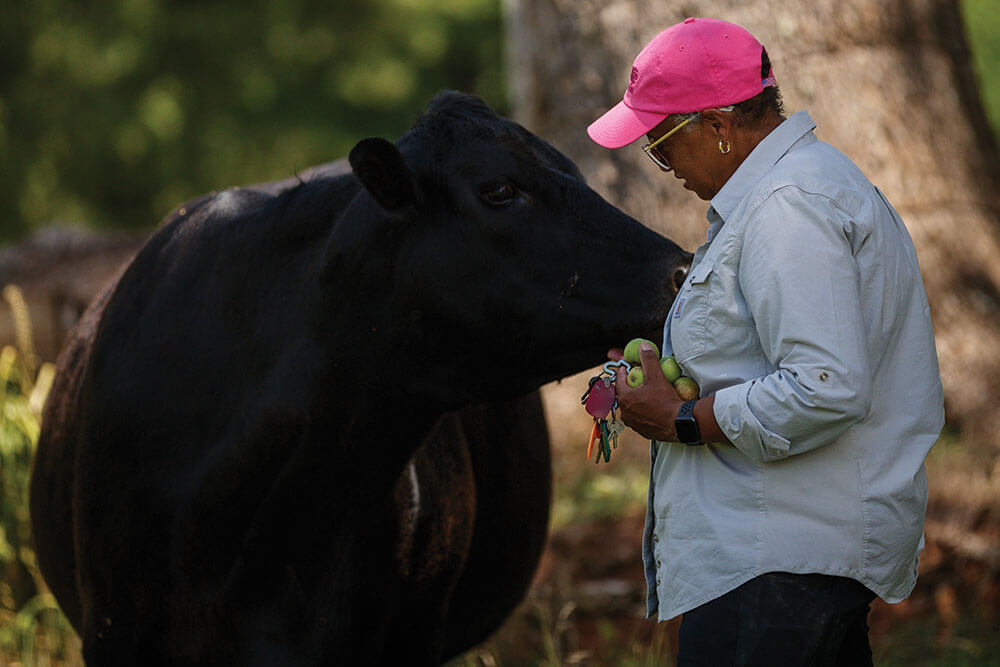

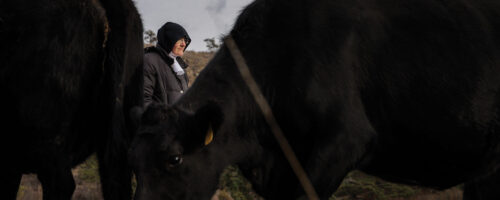

Comment